 |
 |
 |

The staircase
Oskar Serti (Budapest,1881-Amsterdam, 1959) always had the impression that by virtue of climbing a staircase by taking odd-numbered steps, he would never obtain what he really wanted.
Doctor Wierzel, to whom he one day confided this stupid superstition, encou-raged him to not reduce his chances of happiness to a simple number of steps and in mockery advised him to also include the number of bannister pegs in his calculations of probability.
On the 13th of June 1920, after a quick estimate at the foot of this staircase (A), Serti observed with relief that, unlike the steps, there should be an even number of bannister pegs. According to his habit, when he set upon the staircase, he verified his evaluation by fastidiously caressing with his fingertips each one of the pegs which he accounted for with a murmur.
When making his way he saw a lady descending the staircase and suddenly realized with terror that the most elementary rule of etiquette would oblige him to yield his bannister for an instant (B).
When they passed each other, with no other solution left, Serti lightly touched the wrist of this young lady as if it were one of the precious pegs which his hand had become used to not doing without.
Oddly enough, this fortuitous gesture produced in him such a warm sensation of well-being that he ended up climbing the staircase, neglecting to accurately verify his famous calculations (C).
Curieusement, ce geste fortuit produisit en lui une telle sensation de chaleureux bien-être, qu’il acheva de monter l’escalier en négligeant de contrôler la justesse de ses fameux calculs (C). |
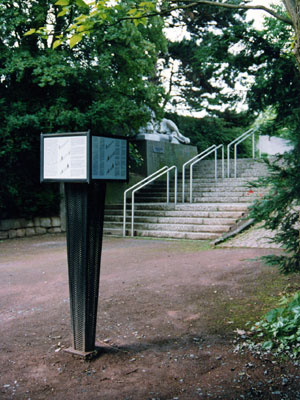

|
Madeleine Ivernol (Rouen, 189?-Paris, 1967), moved by an infinite coquettishness to wear higher and higher heels, suffered the worst difficulties in descending the staircase.
However hard she tried to clutch to the bannister, each descent became an unbearable trial for her.
On the 13th of June 1920, Madeleine Ivernol undertook to descend that staircase, when she perceived a man climbing it with an ease which flabbergasted her; he kept his hand distractedly on the pegs of the bannister, humming a kind of childish counting song.
When he went by her, his hand brushed so delicately against her wrist that she felt a tingling all over her body.
Continuing her descent, she imagined that this man had perhaps looked back at her and so as not to disappoint him, also attempted to adopt a perfectly disengaged posture.
She courageously ungripped her hand from the bannister to let it slide, like him, along the pegs.
By touching the cold metal bars of the bannister, she then discovered with sadness that her delicious tingling was not due to an unavowed feeling, but solely to the frozen hand of this man whose contact with her skin had given her goosepimples (C). |
|
 |
 |
 |

The peebles
On the morning of 5 March 1910 the writer Oskar Serti (Budapest, 1881 - Amsterdam, 1959) was strolling alone in this park when he felt a pebble get into his shoe (A)
Out of laziness, he didn’t remove it immediately and it wasn’t until walking in its company fir five minutes, when its presence became really intolerable, that he finally took off his shoe. While inspecting the sole of his foot, to ascertain if it hadn’t suffered too much from the adventure, he discovered with astonishment that the mark left on the skin by his stone reminded him in a seizing way of a red spot which his regretted Véronique de Coulanges had at the corner of her lips.
Serti was so moved by this likeness that, in painful memory of his cherished friend, he decided tu put the stone back in his shoe and go on his way (B).
Unfortunately, during his stroll, he tolerated so well the discomfort caused by his pebble that he gradually forgot his presence and, when, as a stroke of ill-luck, it fell out of his shoe, Serti didn’t notice right away (C).
Seeing in this loss a sign of destiny which he absolutely wanted to avert, Serti felt compulsed to do everything possible to relocate this famous pebble. He returned to the supposed place of its loss and in front of the multitude of gravel which covered the path, he stuffed his pocket full of little stones, any one of which could have been his.
Thus, during the month while he still sojourned here he put one of these into his shoe before each morning stroll (D), with the secret hope of finding at the end of his constitutional the spot at the corner of Véronique de Coulanges’lips. |
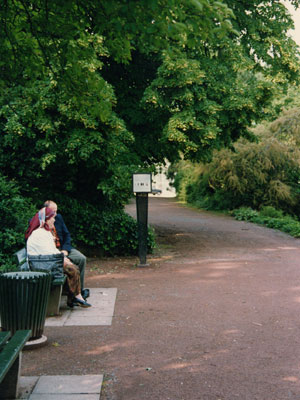

|
|
 |
 |
 |

The appartement
On the 5th of December 1905, Oskar Serti (Budapest, 1881 - Amsterdam, 1959) finally found the apartment building, where he, who he had always considered his master in literature, was leading a retired life : Dorian Erent (Brighton, 1824 - Edinburg, 1906).
Serti passed three days in front of that apartment building (a) not once daring to ring at the door; because, despite the profound alienation from the public from which Erent already suffered at that time, Oskar Serti persisted in esteeming him so highly that an irrepressible humility restrained him from presenting himself to him.
So he stayed there for almost two weeks, posted on the sidewalk, watching his slightest doings and moves, in the hope of learning a little bit more about the creative mechanisms of a man, of whom he had to learn everything.
Every night, thanks to the lights that were switched on and off in the different rooms of the apartment, Serti, who followed the cast shadow of Dorian Erent on the ceiling, succeeded in determining the time he spent writing in his office (b) or seeking inspiration passing from the kitchen (c) to the salon (d).
On the 18th of December, suddenly the lights were blinkings so frantically in all the rooms of the apartment, that Serti was convinced that he witnessed the birth of a chef-d’œuvre, which would finally reconcile Erent with his readers. |

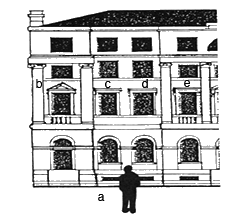
|
On the 5th of December 1905, through the window of his bedroom (e), Dorian Erent perceived at the bottom of his apartment building, a stranger discretely looking in his direction (a).
Since fifteen years of monastic life in his apartment, it was the first time that anyone expressed the slightest interest in him; and this situation cruelly reminded him of the time elapsed when admirers crowded together under his windows.
Before the eyes of a stranger, who was perhaps watching him by accident, Dorian Erent wanred to revive this glorious epoch. Whereas he hadn’t touched a pen for years, he sat down at his desk (b) and, for hours, he pretended to write.
Gradually he recovered - unfortunately not succeeding in availing himself of it - his creative rhythms; from one room to another he resumed his learned passages which once stimulated his spirit. As in former times when he seeked inspiration, he emphasized each of his strolls back and forth between the kitchen (c) and the salon (d), by a meticulously calculated illumination.
On the 18th of December 1905, even if he could only note the date, Erent finally found the profound pleasure of writing another line at the top of a page. He then suddenly remembered the presence of his inseparable stranger outside, and overcome by the sudden fear that he would usurp his writing technique, he conceived the idea of misleading him by illuminating frantically all the rooms of the apartment that had helped him to recover the way of his literary thoughts. |
|
 |
 |

la statue
Le 5 juin 1936, Oskar Serti (A) prononça à Hambourg un discours à l’occasion de l’inauguration d’une statue de Cendrillon (B) commémorant le cent cinquantième anniversaire de la naissance des frères Grimm.
Dès les premières minutes de son intervention, Oskar Serti fut complètement déconcentré par l’étrange sensation d’avoir vécu cette situation dans ses moindres détails ; ses lunettes qu’il tenait fébrilement en main, ce public qui ne l’écoutait pas vraiment (C), ses paroles mêmes qui résonnaient en lui avec la persistance d’un air connu.
Pour briser net cette désagréable impression de reproduire trait pour trait un fragment insoupçonné de vie sa antérieure, Serti interrompit son allocution au beau milieu d’une phrase, espérant par cette action brutale se replonger dans la réalité du moment présent.
Effectivement, la force du silence qui s’ensuivit le libéra de ses appréhensions. Se sentant alors parfaitement maître de lui, Serti voulut poursuivre son discours afin de prouver aux auditeurs son complet retour parmi eux.
Mais juste au moment où il plaça ses lunettes sur le nez, avant même d’avoir repris la parole, il crut entendre quelques spectateurs l’applaudir chaleureusement, comme s’ils avaient compris son trouble et saluaient son unité retrouvée. |
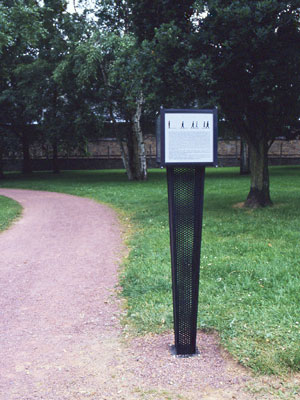

|
Le 5 juin 1936, lors de l’inauguration d’une statue de Cendrillon (B) commémorant le cent cinquantième anniversaire de la naissance des frères Grimm, les membres du cercle littéraire de Hambourg (C) s’étaient rassemblés ici même pour suivre le discours de Oskar Serti (A).
Dès les premières minutes de son intervention, ils jugèrent Serti tellement fébrile qu’ils supposèrent être les témoins de sa toute première allocution publique.
La plupart d’entre eux se désintérèssèrent même très rapidement de son discours, pour se concentrer exclusivement sur l’incessant va-et-vient des lunettes qu’il portait sans arrêt au niveau de son visage, sans jamais malheureusement les déposer une fois pour toutes sur le bout de son nez.
Lorsqu’après un silence pesant, il les installa enfin, quelques spectateurs en furent tellement soulagés qu’ils l’applaudirent ironiquement. |
|
 |
 |
 |
 |

les clés
In the spring of 1938, Oskar Serti came for a week's retreat in Kassel to discover a city whose unsuspected virtues had been boasted to him.
The day after his arrival, however, he suddenly found himself right here, wondering what in fact he came to do there. Curiously, he was unable to answer this question until he noticed at his feet a bunch of keys which had fallen from the handbag of an unknown woman. He thus recalled that an hour earlier, he had embarked upon his morning stroll, exceptionnally without the keys to his house, left in his hotel room, jingling deep inside his overcoat. After having wandered the streets alone for a while (B), he must have instinctively fallen into step with someone with that same special clinking of the keys (C). Irresistably attracted by this person, he must have followed her by ear, imagining himself to be the author of that so familiar metallic sound. Unwittingly, he had thus walked for nearly an hour to the rhythm of this charming unknown woman, until she lost her keys.
As soon as he understood the origin of his involuntary presence right here, he surreptitiously took hold of the keys with the intention of keeping them in his pocket for the duration of a stroll which he planned to have as the spirit moved him.
At the end of his life, Oskar Serti still remembered with pleasure the precise moment of the stroll when he had discreetly agitated the bunch of keys to pass its unfortunate owner whom he thus hoped to carry in his wake during a deliciously solitary visit of the town (D). |
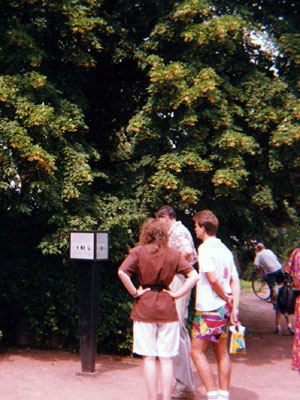

|
|
 |
 |

The light
On the 13th of June 1955, at noon sharp,the writer Oskar Serti, was waiting at this light (A), calculating his chances to the point of obsession, of obtaining the Urtzol prize (the Hungarian equivalent of the Pulitzer). By superstition, he convinced himself that if he could reach the central light before the man in the grey suit who was on the opposite sidewalk, the Urtzol prize would be his...
... As soon as the light changed to green, Serti discreetly hastened his pace to reach the light first.(B) Suddenly, despite his poor eyesight, he perceived with terror that the pedestrian he had chosen as his adversary had also started to cross with an abnormal rapidity. In a unexpected paranoiac fit , Serti imagined for an instant, this person in a grey suit as his major rival for the Urtzol, who resolved himself by an extraordinary series of events, to compete in the same game....
... Not wishing to lose the prize, Serti threw himself, despite his advanced age, in a mad race, which he finished on his knees, half-faint , at the foot of the central light.
To avoid a repeate occurence of such a situation, Serti made the firm resolution to no longer think of this prize at all and persuaded himself of his good intentions by accepting that, if he could succeed in standing up before the light changed red, he would no longer be haunted by the Urtzol. |
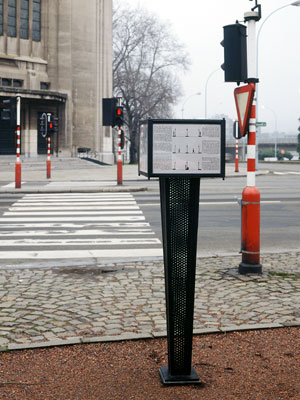
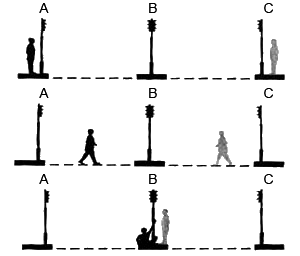
|
Le 13 juin 1955, à midi précis, dans son costume gris des grands jours, Victor Lurkin attendait à un feu rouge (C), impatient de se précipiter dans les bras d’Oskar Serti qu’il On the 13th of June 1955, at noon sharp, sporting the grey suit he reserved for special occasions, Victor Lurkin was waiting at this light (C) impatient to thrust himself into the arms of the writer Oskar Serti whom he perceived at last on the other side of the street. (A).
Lurkin, who had learned by an indiscrete slip of the tongue that Serti had been nominated for the upcoming Urtzol Prize (the Hungarian equivalent of the Pulitzer), had been chasing all over town looking for him, to have the privilege of being the first to make the announcement...
... While they were still quite a few yards from each other, Lurkin observed an abnormally tense expression on Oskar Serti's face, thinking he was the victim of a malaise born from a too powerful emotion which their unexpected encounter could have provoked. He hurried up to him in a panic ...
... At the central light (B), Lurkin found Serti in such a state that he preferred not to break the news to him not wishing to unsettle him even further.
This decision to avoid any allusion to the famous Urtzol Prize suddenly produced such a feeling of liberation in the remotest corners of his soul, that Victor Lurkin asked himself briefly if even he, despite the fact that not a single of his manuscripts had yet been published, was not unconsciously coveting the Urtzol and if, weary of his own disillusions or moved by an unsuspected jalousy, he did not secretly prefer to cease thinking entirely about the prize. |
|
 |
 |

The bench
|
On the 30th of September 1932, after having suffered a violent storm, Oskar Serti (Budapest, 1881- Amsterdam, 1959) took advantage of a calm to sit down on a bench in this garden (A) and to dry a little.
Suddenly, he perceived a young girl in front of him, her eyes timidly looking in his direction, holding a sketchbook. Assuming she was a student of Fine Arts, he accepted out of sympathy to have his drawing made in these clothes, so withered by rain and mud that he could easily pass for a vagabond rather than for the writer that he was.
The young girl, blushing with excitement, unfortunately only had the time to draw a few strokes, as it started to rain again unexpectedly.
During the following night, Serti could not stop thinking about that poor little girl who had bravely thrown herself into that which was probably her first portrait from life.
The following day, driven by the hope te meet his student again, and determined to do everything in order to help her finish her drawing, Serti came back to take his place as a model (a) in the same soaked clothes as the day before.
|
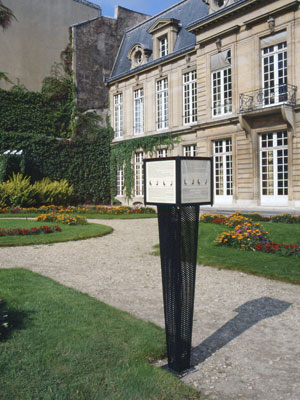
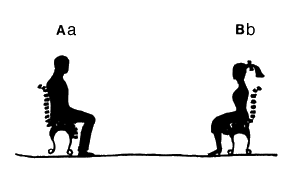
|
The 30th of September 1932, as she was not suspecting that it was raining outside, Josepha Giacometti was roaming through the plastic-arts division of the B.H.V, buying averything her brother needed to draw her portrait.
On the way back, harassed by the large drawing pads with which she was laden, she sat down for a moment on a bench in this garden (B).
Suddenly, she perceived in front of her a vagabond so pitiful, that she decided, despite her extreme timidity, to show him that at least someone in this town was intersted in him.
Feverishly she took the sketchbook, meant for her brother, and pretended to draw the poorman.
Unfortunately the rain interrupted her good intentions, and she returned home in great haste.
The following day, consumed with remorse of having cowardly abondoned an outcast in his dreadful desolation, she decided to return to this garden (b) hoping to see her protege again and to pursue her simulation. |
|
 |
 |
 |
 |
 |

The trashcan
When, on the 14th of March 1912, Oskar Serti (Budapest, 1881-Amsterdam, 1959) came here for the first time, he was directly struck by the extraordinary resemblance between this place and the one which he had imagined as the setting for the moving encounter of Jeanne Berstein and François Virteuil, the two heroes of his last novel.
From the fork in the roads to the blanket of autumn leaves, everything was perfectly identical. The presence of this trashcan alone wavered from the reality of his book. With an amazing care for conformity, Serti considered it to be so completely out of character with the profound romanticism of the scene that he decided to remove it and place it further away.(B).
Having just taken hold of this very trashcan, he perceived two individuals glaring at him.(C). To camouflage his ill-intentions, he tried to pretend to be brutally throwing some object inside, but the only thing he found in his pockets which he could sacrifice, was a copy of his own book. Refusing to commit such a sacrilegious act, he thus felt compelled to explain the reasons of his strange behavior to these individuals and, to justify himself further, read long passages of his text to them.
Never did he realize that these two individuals, being greatly irritated, were not even listening to him but were looking at each other like two lovers willing to accept all, even the destruction of a trashcan, to find themselves finally alone at their meetingplace (D). |


|
|
 |
 |
 |
 |
 |
 |
 |
 |
 |
 |
 |
 |
 |
 |
 |
 |
 |
 |
|

































